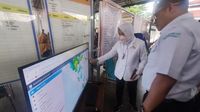In Indonesia, the dream of pursuing a career in meteorology, climatology, and geophysics often faces hurdles due to the perception of stringent admission processes at government-affiliated schools. The Sekolah Tinggi Meteorologi Klimatologi dan Geofisika (STMKG) offers an alternative, providing students with the opportunity for free higher education under the auspices of the Badan Meteorologi, Klimatologi, dan Geofisika (BMKG). This institution not only prepares students for a stable career but also plays a vital role in addressing the pressing issues of climate change and natural disasters.
Every year, thousands of prospective students from across Indonesia compete fiercely for a spot at STMKG. The allure of guaranteed employment as an Aparatur Sipil Negara (ASN) within BMKG is a significant draw for many applicants. This direct pathway to public service is particularly appealing in a nation where job security is a priority for many graduates.
STMKG offers specialized programs in Meteorology, Climatology, Geophysics, and Instrumentation, equipping students with the knowledge and skills essential for various sectors, including agriculture, aviation, maritime, and disaster mitigation. As climate change continues to pose a global threat, the demand for experts in these fields is more critical than ever.
Despite the competitive nature of the admissions process, the high number of applicants indicates a growing interest in this field. To enhance their chances, applicants are encouraged to prepare academically, focusing on subjects like Mathematics, Physics, and English, while also maintaining good physical health, which is a requirement for the selection process.
Understanding the registration requirements and procedures is crucial for potential students. Detailed information is typically released through official channels such as the BMKG and STMKG websites. By being well-prepared and informed, candidates can avoid common pitfalls that might jeopardize their chances of admission.
In addition to STMKG, the article highlights the broader landscape of Sekolah Kedinasan, which has become a strategic choice for high school graduates aspiring to serve in government institutions. The appeal of these schools lies not only in the free education they offer but also in the monthly allowances and various supporting facilities provided during the study period.
Each Sekolah Kedinasan has its own selection process, which generally includes administrative selection and a series of competency tests. For instance, to enter the Politeknik Keuangan Negara STAN (PKN STAN), candidates must undergo five stages: administrative selection, competency tests, psychological assessments, health checks, and interviews. Similarly, other institutions like the Institut Pemerintahan Dalam Negeri (IPDN) and Sekolah Tinggi Intelijen Negara (STIN) have their own rigorous selection processes that include character assessments and physical fitness tests.
The STMKG selection process specifically entails an academic test covering Physics, Mathematics, and English, alongside health and fitness evaluations. This comprehensive approach ensures that only the most qualified candidates are admitted, reflecting the high standards expected in these vital fields.
As the government continues to emphasize the importance of professional, resilient, and high-integrity civil servants, the establishment of these schools represents a strategic initiative to cultivate a new generation of public service professionals. With the right preparation and commitment, aspiring students can seize the opportunity to become part of this noble cause.
In conclusion, the STMKG and other Sekolah Kedinasan are more than just educational institutions; they are gateways to fulfilling careers that contribute significantly to the nation's development and resilience against environmental challenges. As the application season approaches, potential candidates are urged to prepare thoroughly and take advantage of the opportunities these schools present.


